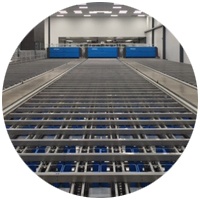
Following a busy season of installations and upgrades to existing customer lines earlier in the year, the 2016 Pacific Northwest (PNW) cherry is now wrapped up. Talk about a good season – high quality product and the 3rd largest packout ever achieved.
“It was one of the best seasons in recent history. Growing conditions were optimal; we had a good size crop with large fruit size. Consumers were very happy with fruit quality and their eating experience" – Andy Tudor, Director of Business Development, Zirkle Fruit Company.
2016 season in review
The start of the 2016 season was not without its challenges. Following shipments of 19 million 20lb boxes valued at $US827M in 2015, the PNW Cherry industry was initially hopeful of delivering 20.7 million boxes in 2016. However, by mid-May, Northwest Cherry Growers, the voice of the Washington cherry industry, lowered its outlook for the season to 18.3 million boxes. Spring had experienced rapid bloom and poor pollination, which harmed fruit formation and Northwest Cherry Growers were expressing quality concerns around the Bing variety crop (Culverwell, 2016).
According to B.J Thurlby, president of the Washington State Fruit Commission – Northwest Cherry Growers, “Three consecutive days of 100+ degree heat (Fahrenheit) from June 5th to 7th hit us in early Bing harvest and caused some panic in the industry.”
Despite the initial dim outlook and 21 separate days of rainfall in June and July, the season began to turn around. Good orchard management resulted in larger sizing, and continued investment in the latest packhouse optical sorting equipment reduced fruit give-away, and made the grading of questionable fruit economic while guaranteeing consistently high-quality product throughout the season.
“One dedicated grower ran helicopters over his ranches 24 separate times… the good news is the market stayed strong in July and early August and with the help of optical sizing/sorting technology we were able to pack sweet cherries that delivered on our promise of ‘the diamond of fruit’ to consumers around the globe” (Thurlby, 2016).

Investing in the latest technology
Pacific Northwest packhouse’s investment in the latest technology has paid off. The latest sorting and packing equipment enables packhouses to adjust quickly and efficiently to changes in supply, while giving them the flexibility to create products for specific consumer niches. Danelle Huber, Marketing Director of Van Doren Sales, the supplier of Compac equipment to Washington confirms the continued investment.
“With record crops continuing to blossom, the need for technology on our packing lines is quickly becoming number one on our industry’s priority list. This year we supplied the first sorting equipment capable of concurrently running multiple varieties, providing customers greater flexibility and improved labor utilization. This was well received by our customers who are focused on return on investment, service, and overall grower returns."
Investing in flexible advanced lines
New technology from Compac and Van Doren Sales is allowing for more flexible layouts and longer sorter configurations. Newly installed 48-lane systems at Zirkle Fruit Company in Selah, and Stadelman’s Fruit in Zillah, have been equipped with new hardware and software solutions allowing multiple cherry varieties, including the more delicate Rainier variety, to be run concurrently across one line. This solution significantly improve s the line’s flexibility and ease of operation, and eliminates the need for a dedicated Rainier packing line. Zirkle Fruit Company’s General Manager, Scott Pryse, agrees.
s the line’s flexibility and ease of operation, and eliminates the need for a dedicated Rainier packing line. Zirkle Fruit Company’s General Manager, Scott Pryse, agrees.
“On a day when we don’t have a large amounts of darks, we can run lights [Rainier variety] at the same time and really utilize the available staff.”
Compac’s small fruit sorter (SFS) installed at Zirkle Fruit is special for being possibly the longest cherry sorter in the world at 62m (203ft) measured from load-belts to drive. This industry trend towards longer sorting equipment follows a similar trend in the Washington apple industry and the Californian citrus industry where 85m (280ft) Compac sorters operate with optimal uptime and reliability. Compac’s long-machine capability allows packers to increase packing variations, providing greater flexibility and allowing the creation of specific products tailored to specific customer requirements.
Investing in upgrades
Packhouses are also investing in upgrades to existing equipment in order to improve defect grading, sizing and hardware performance. Compac is committed to providing these existing customers with the latest technology, and during the off-season installed inspection system and sorter hardware upgrades at Northwest sites.
The upgrades included the latest version of Compac’s SFS inspection software supported by more powerful computer hardware. ‘Cherry Defect’, a new feature of SFS InVision 4.1, provides industry leading defect identification and classification, allowing the user to quickly and easily build grade maps on a user-friendly click-to-select  interface. This, combined with improved algorithms, provides increased accuracy with specific improvements observed for spurs and doubles, crack, bruises, and localized soft spots. According to Scott Pryse, this feature was of particular benefit this season due to the 21 days of rainfall.
interface. This, combined with improved algorithms, provides increased accuracy with specific improvements observed for spurs and doubles, crack, bruises, and localized soft spots. According to Scott Pryse, this feature was of particular benefit this season due to the 21 days of rainfall.
“In a year with such a weather event, we would have previously had to turn away some growers. Now we are able to accept all the cherries and maintain throughput. Growers have really benefited from the investment as a lot of fruit has been packed that previously would have not made it to the consumer.”
With a short season and long operating hours, cherries also provide a unique reliability and uptime challenge. With this in mind, Compac released and installed upgrades to improve sorting consistency and reduce downtime and maintenance. One upgrade, a highly-precise automatic chain lubricator helped to reduce wear over the season, improve timing consistency, and reduced maintenance requirements.
Compac has also formed a Cherry Operatons Team who travel globally to provide in-field, in-season support, and liaise closely with the designers to continuously refine the solution. Compac’s Cherry Operations Manager, Ian Wright, believes continuous improvement is an essential part of leading the cherry sorting market.
“The Pacific Northwest is currently our biggest cherry market and with packers operating up to 20 hours a day, reliability and stability are absolutely essential. Committed to continuous performance improvements, we work closely with customers to test and develop upgrades. The additional improvements we installed this year have really created a well-rounded and highly stable solution.”
With consumers demanding an increasingly consistent product, and growers looking to maximize packout no matter the weather conditions, investment in technology such as optical sorters looks set to continue. The 20.8 million high-quality 20-lb pound boxes shipped this year is a testament to the continued investment by growers and packers in the latest technology.


